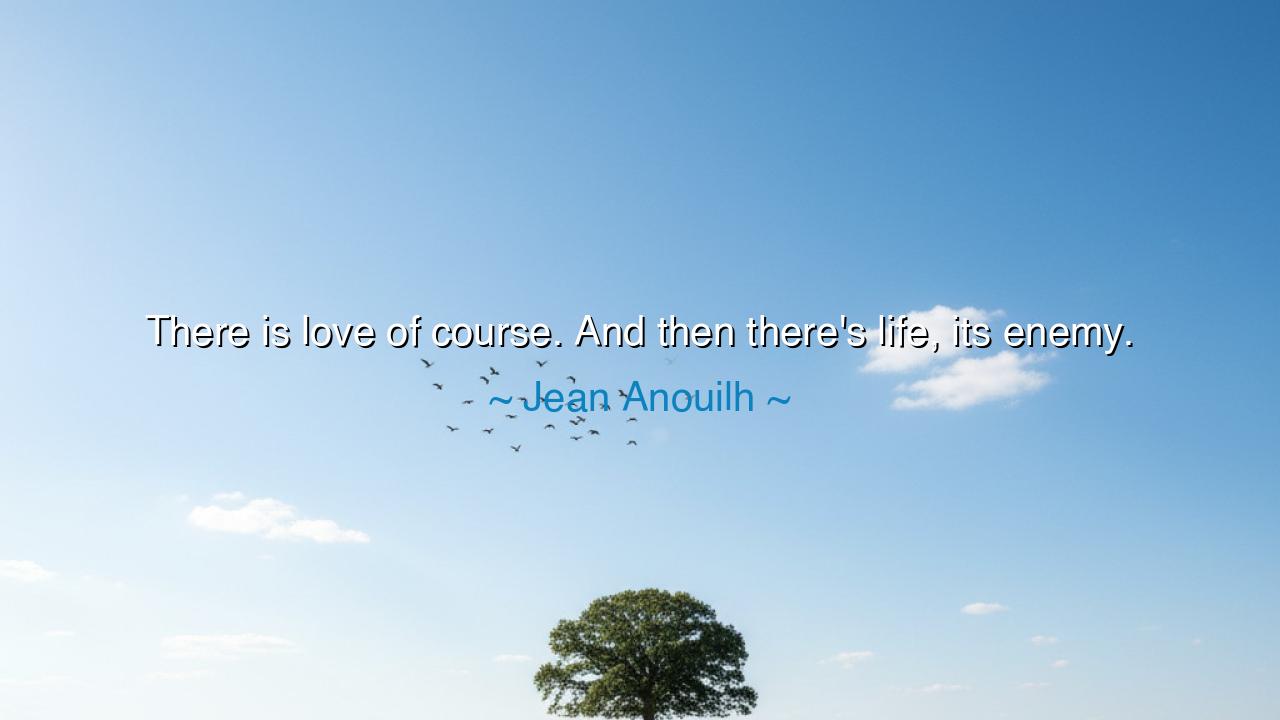
There is love of course. And then there's life, its enemy.






"There is love of course. And then there's life, its enemy." Thus wrote Jean Anouilh, the French dramatist whose pen carved both beauty and despair into the stage of the human heart. In this haunting line, he reveals one of the oldest struggles of existence—the war between love and life, between the ideal and the real, between what the heart yearns for and what the world demands. Love, in its purity, seeks eternity; life, in its restless flow, breaks all things apart. The one desires union, the other insists on separation. And so, as Anouilh understood too well, every lover stands torn between the dream of forever and the truth of mortality.
The origin of this thought lies in the heart of Anouilh’s art and age. Living through the dark storms of twentieth-century France, amid war and disillusionment, he saw the tension between purity and compromise reflected in human souls. His plays—particularly Antigone—echo this struggle, where the spirit of love and truth confronts the harsh laws of survival and power. For Anouilh, love was not a sweet escape but a divine rebellion against a world too flawed to sustain it. In a world of ambition, deceit, and duty, love appears as a fragile miracle—and thus, the two cannot easily coexist. Life is the battlefield; love, the wounded soldier who refuses to surrender.
When he says, “There is love of course,” Anouilh acknowledges that love is the eternal constant, the divine spark that burns even in the darkest ages. But when he adds, “And then there’s life, its enemy,” he confesses the tragedy of human existence: that love, though sacred, is constantly wounded by the demands of daily living—by pride, by duty, by time, by circumstance. The heart may long for absolute devotion, but the world forces compromise; the lover may seek forever, but life insists on endings. The very structure of existence seems hostile to the permanence of love, for life itself moves in cycles of birth and decay.
Consider the tale of Romeo and Juliet, those immortal lovers of Verona. Their love was pure flame, untouched by calculation, untainted by fear. Yet life—the world of family, honor, and hatred—rose against them. They lived for love, but life itself conspired to separate them. And in death, they found what life denied them: peace, unity, and eternal remembrance. Their tragedy embodies Anouilh’s truth—that love is divine rebellion, but life, with all its barriers and boundaries, too often destroys what is most divine in us.
Yet there is another way to understand this paradox. Perhaps Anouilh does not mean that life is truly the enemy of love, but that it tests it—purifies it. For love that survives suffering, time, and loss becomes something greater than desire; it becomes sacrifice, faith, and eternal meaning. The ancients spoke of this when they said that love is born in heaven but tested on earth. Life, then, is not the destroyer of love, but its crucible. Through trials, love proves itself worthy of eternity. To love deeply in a world that breaks all things is not foolish—it is divine courage.
Still, Anouilh’s melancholy cannot be dismissed. There are times when the weight of life—its routines, betrayals, and harsh realities—can suffocate the soul’s capacity for wonder. Many lose their love not because it dies, but because they forget to nurture it amidst the noise of survival. The poet’s warning is clear: if we let life’s bitterness rule us, if we allow cynicism and fear to harden our hearts, then love will fade, and we will live—but we will no longer be truly alive. For life without love is existence without meaning.
So, my listener, take heed of this ancient struggle between love and life, and let it awaken wisdom in your own heart. Do not flee from life, for it is the field where love must grow—but do not let life’s demands consume your capacity to love. Guard your tenderness fiercely. In the noise of the world, keep a quiet space where love may dwell unbroken. Let love be your rebellion against the coldness of existence—your sacred defiance against time itself.
For in the end, Jean Anouilh’s truth is both lament and instruction. Yes, life is the enemy of love—but it is an enemy worth fighting. Every day that you choose compassion over indifference, forgiveness over pride, devotion over despair, you declare victory in that eternal war. For though life may be fleeting, love—when lived bravely—defies even death. And in that defiance, we find the only kind of immortality that truly matters.






AAdministratorAdministrator
Welcome, honored guests. Please leave a comment, we will respond soon